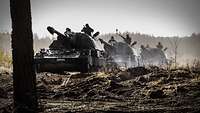
The Bundeswehr on Operations
Since the 1990s, the Bundeswehr has been active on long-term operations abroad, sometimes for years.



Since the 1990s, the Bundeswehr has been active on long-term operations abroad, sometimes for years.
On these operations abroad, the Bundeswehr makes important contributions to global security and stability. German military personnel have a wide variety of tasks. For example, they train other armed forces, advise security authorities and provide medical care. The Bundeswehr monitors various maritime areas, preventing human trafficking and weapons smuggling together with its allies, and protecting NATONorth Atlantic Treaty Organization’s eastern flank, airspace and sea territories.

The Bundeswehr is shaped by its operations
BundeswehrThe history of the Bundeswehr’s operations starts with the end of the Cold War, and German reunification. UNSCOMUnited Nations Special Commission (United Nations Special Commission) in Iraq became the Bundeswehr’s first operation abroad. After the end of the Gulf War, the Bundeswehr participated in the UNUnited Nations mission to monitor CBRNchemical, biological, radiological, nuclear (chemical, biological, radiological, nuclear) weapons in Iraq.
The parliamentary participation required for operations abroad only developed over the course of time. Since 1994, the German Bundestag has made decisions regarding the deployment of Bundeswehr forces abroad. In 2005, the established parliamentary practice resulted in the Parliamentary Participation Act, which is the legal basis for mandating operations abroad to this day.
The Bundeswehr has successfully monitored maritime areas, participated in training missions, provided logistic and medical support, and conducted combat operations. The Bundeswehr has now completed almost 50 operations abroad.
The Bundeswehr Joint Forces Operations Command is located outside Potsdam, near Berlin. Bundeswehr operations are planned and conducted at this command, which is directly subordinate to the Federal Ministry of Defence. As the operational level of command, the Bundeswehr Joint Forces Operations Command issues the national orders for the contingent commanders in the mission areas.
The Bundeswehr Joint Forces Operations Command ensures that the deployment of German forces is in compliance with the mandate and does not violate the laws and regulations of the Federal Republic of Germany. The Commander of the Bundeswehr Joint Forces Operations Command is responsible to the Chief of Defence for command and control of the operational forces subordinate to the Commander.
Military personnel are currently serving on operations on three continents. They have a wide variety of tasks. For example, German soldiers train Nigerien, Iraqi, and Lebanese forces on different missions. On these and other missions, the Bundeswehr also advises national security authorities.
In addition, the Bundeswehr monitors various maritime areas.
The Bundeswehr supports peace efforts in other UNUnited Nations missions, such as in Lebanon (UNIFILUnited Nations Interim Force in Lebanon), South Sudan (UNMISSUnited Nations Mission in South Sudan) and Western Sahara (MINURSOMission des Nations Unies pour l'organisation d'en Referendum au Sahara Occidental).

Three self-propelled howitzers of the Bundeswehr (PzH 2000) move into their firing positions in Pabrade in Lithuania. As part of the enhanced Forward Presence Battle Group, they are protecting NATONorth Atlantic Treaty Organization’s eastern flank in the Baltic region.
Bundeswehr/Pascal WarnerFollowing the completion or near completion of the Bundeswehr’s biggest international crisis management operations, such as the Resolute Support mission in Afghanistan or EUTMEuropean Union Training Mission Mali and MINUSMAMultidimensionnelle Intégrée des Nations Unies pour la Stabilisation au Mali in Mali, an increasing number of German military personnel are committed to NATONorth Atlantic Treaty Organization and European Union defence programmes – at sea, on land and in the air.
As part of NATONorth Atlantic Treaty Organization’s Standing Naval Forces and Standing Mine Countermeasures Forces, the German Navy protects NATONorth Atlantic Treaty Organization’s sea territories in the Mediterranean, the Atlantic Ocean, the North Sea and the Baltic Sea. The German Air Force is involved in protecting airspace as part of intensified Baltic Air Policing at NATONorth Atlantic Treaty Organization’s borders, both in the Baltic region (such as Estonia) and in South-Eastern Europe (Romania). The Bundeswehr Air Force uses air defence systems to contribute to airspace control on the ground.
NATONorth Atlantic Treaty Organization partner Lithuania is the main focus of Germany’s commitment to defend NATONorth Atlantic Treaty Organization’s eastern flank on the ground. The Bundeswehr has been present with troops in this country for many years. Together with its international partners and Lithuanian hosts, the Bundeswehr has been exercising the defence of NATONorth Atlantic Treaty Organization’s borders, thereby contributing to credible deterrence of Russia. Participation in other NATONorth Atlantic Treaty Organization programmes and NATONorth Atlantic Treaty Organization response forces (especially the Very High Readiness Joint Task Force – VJTFVery High Readiness Joint Task Force ) regularly leads to the commitment of military personnel and to involvement in exercises abroad.
In total, there are several thousand Bundeswehr soldiers deployed on missions abroad and in NATONorth Atlantic Treaty Organization standby commitments.

Worthy remembrance: The Bundeswehr Memorial commemorates soldiers who lost their lives
Bundeswehr/Andrea BienertService abroad entails many dangers. More than 100 German military personnel have lost their lives on operations abroad due to accidents, illness or combat.
Military personnel have set up groves of honour in theatre to commemorate their fellow soldiers who died on operations.
A central Bundeswehr Memorial at the Federal Ministry of Defence commemorates all members of the Bundeswehr who lost their lives in the line of duty.
The Forest of Remembrance, an area of approximately 4,500 square metres at the Bundeswehr Joint Forces Operations Command near Potsdam, complements the Bundeswehr Memorial.
The Bundeswehr will continue to be shaped by its operations in the future. They have become as important as national and collective defence.